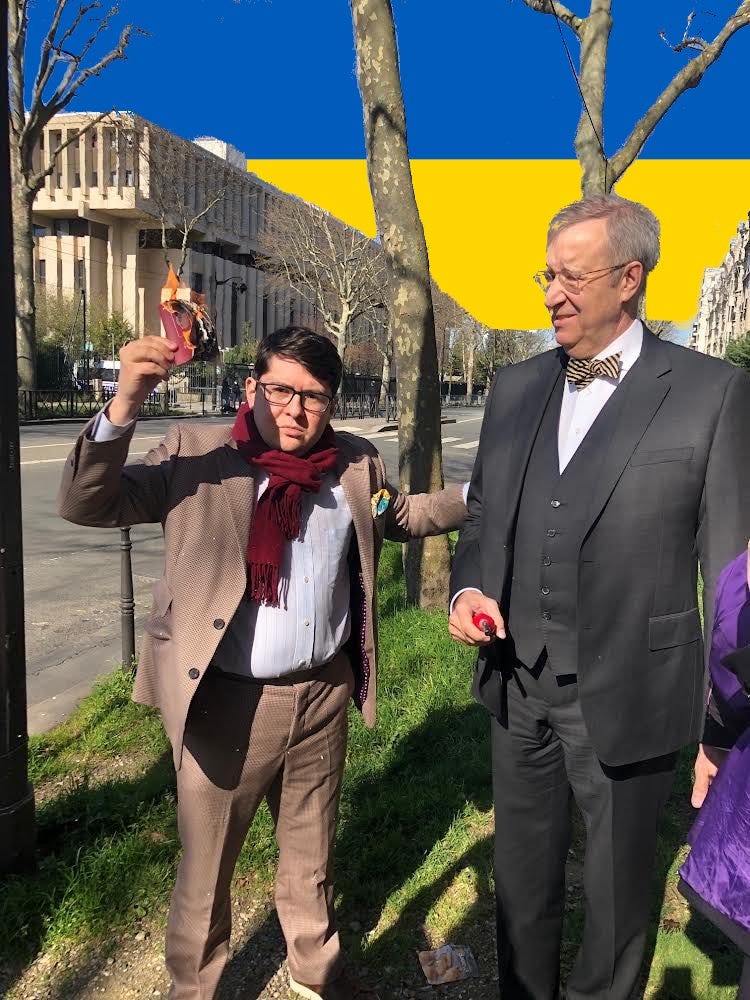Vladislav Davidzon and Toomas Hendrik Ilves join the Cosmopolicast today to discuss everything related to the war in Ukraine.

Here are some of the topics we covered:
How Russia uses frozen enclaves to dominate the post-Soviet space;
The folly of “negotiating” with Russia;
Does the Biden Administration understand that a frozen conflict is victory for Russia?
Does the West understand how catastrophic a Russian victory would be?
Do the big powers want Ukraine to win?
The Western approach-avoidance conflict;
Loose nukes and the Budapest Memorandum;
Why Russia won’t break up on ethnic lines, but might descend into medieval warlordism;
The schism between Central and Eastern Europe and the Franco-German engine;
Why Germany won’t #FreeTheLeopards;
The West’s leadership deficit.
Should you be able to burn the Koran in Sweden?
The sources and consequences of European technocracy;
Why is the West dominated by mediocrities?
Will we succeed in getting enough weapons into Ukraine’s hands?
Will Ukraine run out of bullets before Russia runs out of bodies?
The brewing Russian counteroffensive;
The prospects for a Russian uprising;
The prospects for a Russian Night of the Long Knives;
The prospects for a liberal Russia;
The sources of Russia’s resentment of Ukraine;
How Ukrainians envision the future;
How we rate Biden’s management of the conflict;
Is Jake Sullivan the Administration’s weak link?
What it will take to get the Russians out of Ukraine?
Will Russian war criminals ever face justice?
Why are America’s National Conservatives so obtuse?
What we’d do differently if we were running the Biden Administration.
Links to the articles, books, and threads we discuss:
David Frum’s thread about negotiations:
Since 1991, post-Soviet Russia has fought two wars inside Chechnya. It has waged wars across internationally recognized borders against: Moldova, Georgia (twice), and Ukraine (2014 and then again in 2022). Russia intervened in the Syrian civil war and between Armenia and Azerbaijan.
It’s often claimed that “all wars end in negotiations.” But to date, none of post-Soviet Russia’s many wars have ended that way. Instead, post-Soviet Russia’s wars have tended to freeze into perpetual unresolved conflicts, with Russia retaining chunks of other people’s territory—enduring international opprobrium—and waiting out any ensuing sanctions.
A reason that post-Soviet Russia’s wars end as “frozen conflicts” is that they have ended on terms more or less satisfactory to Russian leadership. Russian leaders have never seen any need for a more formal resolution that might require some concession to adversaries.
If the 2022 invasion of Ukraine were to end today, it would end as another “frozen conflict.” From a Russian point of view, there’d be little to negotiate. They’ve still got Crimea, Donetsk, and Luhansk. They didn’t colonize the rest of Ukraine, but they mauled and terrorized it.
The status quo is acceptable enough to post-Soviet Russia. So when prominent people urge negotiations now, they are urging a policy that would award Russia a good-enough win—and leave Ukraine broken and vulnerable to further Russian aggression/pressure.
What might induce Russia to change its established pattern and—for the first time—negotiate an end to a war that it started? Only one thing: fear that the war is trending in a direction even more unacceptable than any concessions necessary to end the war Russia started.
To get to negotiations with Ukraine, Russia needs to genuinely fear that it could lose its war against Ukraine—lose catastrophically enough that negotiations become a less unacceptable alternative to Russia’s leaders.
The way to get to negotiations is, therefore, to arm Ukraine to the point where Russian leaders fear defeat. The way to thwart negotiations is to withhold arms from Ukraine and leave Russia’s leaders with hope they can preserve the status quo. To put it more formally, Russia’s preferences look like:
Russian victory > frozen conflict > continuing war > negotiations requiring concessions.
The West can only “jump to negotiations” after it has denied Russia any hope of success from first three preferences.
American officials read the riot act to Germany after Chancellor Olaf Scholz’ refusal to send Leopard tanks to Ukraine. The reports of a furious dressing down came as Poland suggested it and other Nato allies may organize their own tank alliance without Berlin.


Poland could send Leopard tanks to Ukraine without German approval. Polish prime minister says key issue is to get military aid to Ukraine urgently as US unveils fresh $2.5 billion aid package including fighting vehicles but not tanks.
The case for a Ukrainian nuclear deterrent, by the older, better, wiser and more prescient John Mearsheimer.
The Third Empire, the cult of Stalin, neo-medievalism, and the sources of Russian Conduct: Dina Khapaeva introduces Mikhail Yuriev.
What, Actually, Is Germany’s Problem with Russia? by Peter Pomerantsev
The Godfather, by Mario Puzo
Listen to this episode with a 7-day free trial
Subscribe to The Cosmopolitan Globalist to listen to this post and get 7 days of free access to the full post archives.













